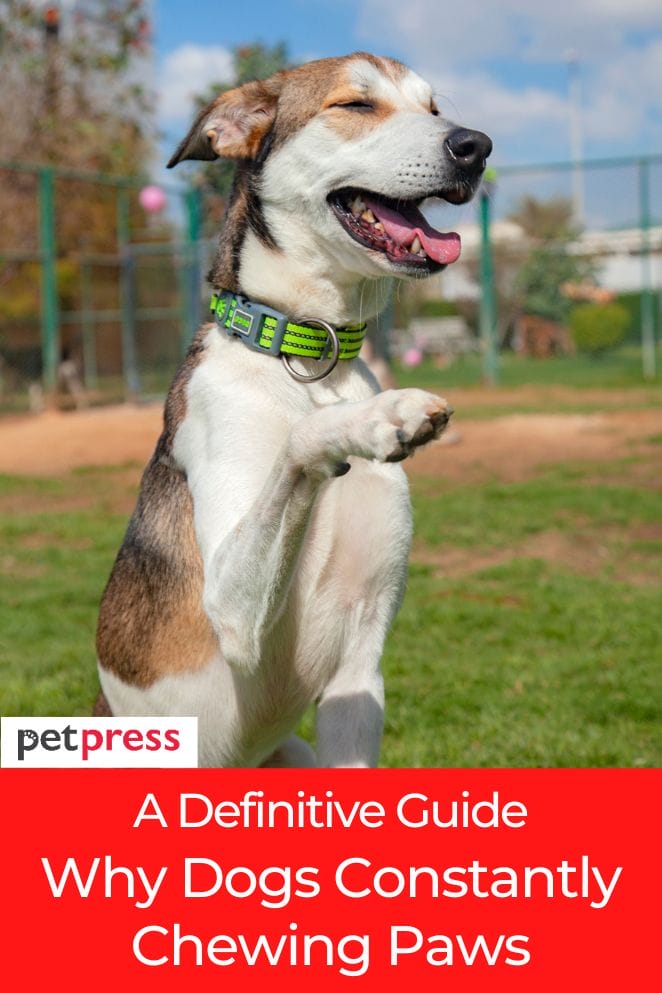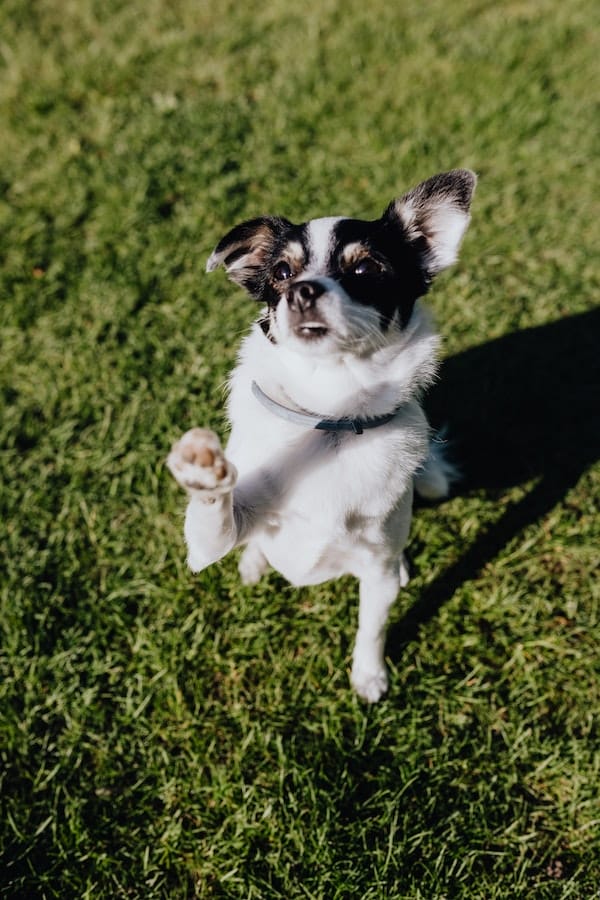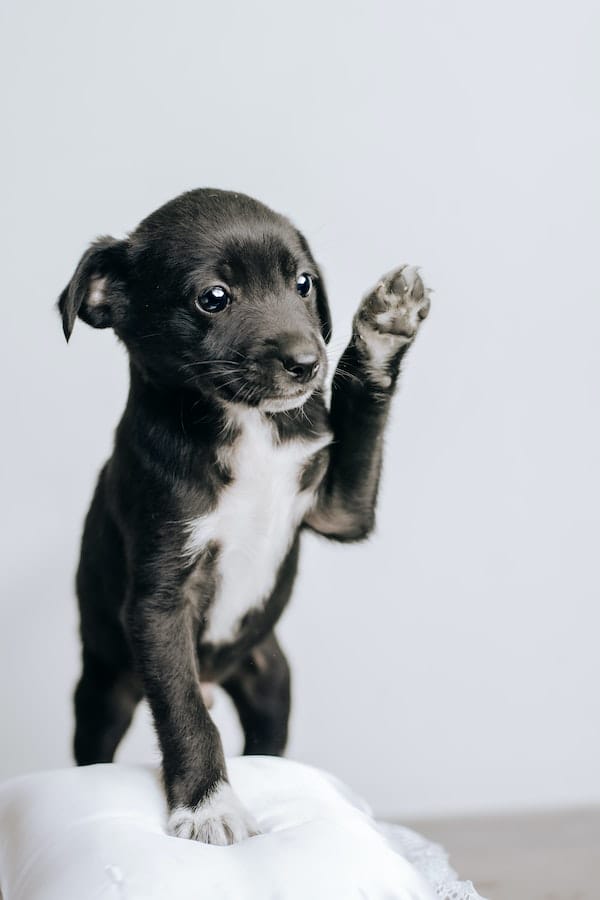
Is your cherished furry companion testing your patience with their relentless paw-chewing?
You’re certainly not alone!
The habit of dogs constantly gnawing at their paws can be a puzzling and frustrating ordeal for pet owners.
In the forthcoming article, we’ll delve deep into the common motivations behind this behavior and offer practical solutions to aid your four-legged friend in discovering the relief they so earnestly seek.
Let’s unravel the enigma behind why your dog can’t seem to resist indulging in paw-chewing.
Common Reasons for Paw Chewing
Dogs, like us, may have their reasons for indulging in this behavior.
Understanding the root causes behind your dog’s constant paw chewing can be the first step in helping them find comfort.
Here are some of the most common reasons why your dog might be persistently chewing its paws:
Allergies
Allergic reactions, whether triggered by certain foods, environmental elements like pollen or dust, or even reactions to grooming products, can incite itchiness in your dog’s paws.
This persistent itch often drives them to chew in a quest for relief.
Parasites
Tiny but troublesome parasites like fleas, ticks, or mites can irritate your dog’s paws, causing discomfort and provoking chewing as a means of relief.
Regular preventative measures are crucial to keep these pests at bay.
Dry Skin
Just like humans, dogs can experience dry and itchy skin.
This condition can affect their paws, leading to persistent paw-chewing. Factors like weather conditions or certain breeds’ predispositions can contribute to dry skin in dogs.
Boredom or anxiety
Dogs are not immune to boredom or anxiety, and sometimes they resort to paw-chewing as a way to cope with these feelings.
Ensuring your dog is mentally and physically stimulated can help reduce this behavior.
Injury or pain
An undetected injury or underlying pain in the paw or leg can lead to constant paw-chewing as your dog attempts to self-soothe.
It’s essential to rule out any physical discomfort through a thorough examination by a veterinarian.
Allergic dermatitis
Allergic dermatitis, triggered by contact with allergens like grass or chemicals, can result in itchy paws.
Identifying and avoiding these triggers can help alleviate the issue.

What to do if your dog is constantly chewing its paws
Now that we’ve explored the common reasons behind your dog’s paw-chewing, let’s discuss what you can do to help them find relief:
Regular paw checks
Commit to routinely examining your dog’s paws for any signs of injury, irritation, or the presence of foreign objects.
Early detection can prevent the escalation of issues that may lead to excessive paw-chewing.
Allergy management
Collaborate closely with your veterinarian to pinpoint and manage any underlying allergies that might be triggering your dog’s paw-chewing behavior.
This may involve dietary adjustments or identifying and avoiding specific allergens in their environment.
Parasite prevention
Shield your furry companion from the torment of parasites by diligently using veterinarian-recommended flea and tick preventatives.
Consistency is key in preventing infestations that could exacerbate paw irritation.
Paw soaks
Provide relief to your dog’s irritated paws by treating them with gentle and veterinarian-approved paw soaks or moisturizers.
These products can help soothe any discomfort and promote healing.
Provide mental stimulation
Keep your dog mentally engaged and content by offering a variety of toys, puzzles, and interactive play.
Mental stimulation not only wards off boredom but can also help alleviate anxiety, potentially reducing paw-chewing driven by stress or restlessness.
Regular exercise
Ensuring your dog receives adequate physical exercise is crucial.
Regular walks runs, or playtime can help alleviate anxiety and reduce the inclination to chew on their paws out of sheer boredom or excess energy.

When to Consult a Vet
While occasional paw-chewing is normal, constant and excessive chewing may signal an underlying issue. Consult your vet if:
Severe and persistent paw-chewing
If your dog’s paw-chewing becomes relentless and doesn’t subside despite your efforts to address it, it’s a clear signal that something more concerning may be at play.
Persistent paw-chewing can be a red flag for various issues, from allergies to skin infections, and a vet can help identify the cause and provide appropriate treatment.
Signs of infection
If you observe any signs of infection on your dog’s paws, such as redness, swelling, the presence of pus, or a foul odor, it’s imperative to consult your vet promptly.
Paw infections can worsen rapidly and may require antibiotics or other medical interventions to resolve.
Behavioral changes
Any noticeable shifts in your dog’s behavior that suggest pain or distress should not be ignored.
This could include a reluctance to bear weight on the affected paw, increased irritability, or changes in their overall demeanor.
Behavioral changes often accompany physical discomfort, and your vet can assess and address both the underlying issue and any behavioral consequences.
Self-inflicted injury
If your dog’s incessant paw-chewing leads to self-inflicted injuries, such as open sores or hair loss, immediate veterinary attention is crucial.
These injuries can quickly worsen and may necessitate specialized care.
Unresponsive to home remedies
If you’ve attempted home remedies or changes in their environment to alleviate the paw-chewing without success, it’s an indication that professional intervention may be required to identify and address the root cause.
A chronic or recurrent issue
If your dog experiences chronic or recurrent episodes of paw-chewing, it’s essential to consult your vet.
Chronic issues may be indicative of underlying conditions that require ongoing management or treatment.
Conclusion
Getting to the bottom of why your dog can’t seem to stop chewing on its paws is the initial stride towards providing them the relief they so desperately need.
Whether the cause is allergies, boredom, or an underlying injury, there are indeed practical methods to ease their discomfort.
Always bear in mind that the well-being of your canine companion is more than deserving of every effort you put into resolving their persistent paw-chewing habit.
FAQs
It’s best to consult your vet before applying any creams to your dog’s paws, as some products may not be safe or effective.
Provide a variety of toys, engage in interactive play, and consider puzzle toys or treat-dispensing toys to keep your dog mentally active and happy.
Consult your vet to identify allergens and create a management plan. This may include dietary changes or allergen avoidance strategies.
- Does Cat Litter Melt Ice? The Complete Guide to Winter Safety - January 30, 2026
- Happy Tail Dogs: Understanding This Common Canine Condition - January 29, 2026
- How Cold Can Outdoor Cats Handle? Feline Winter Safety - January 27, 2026


GIPHY App Key not set. Please check settings